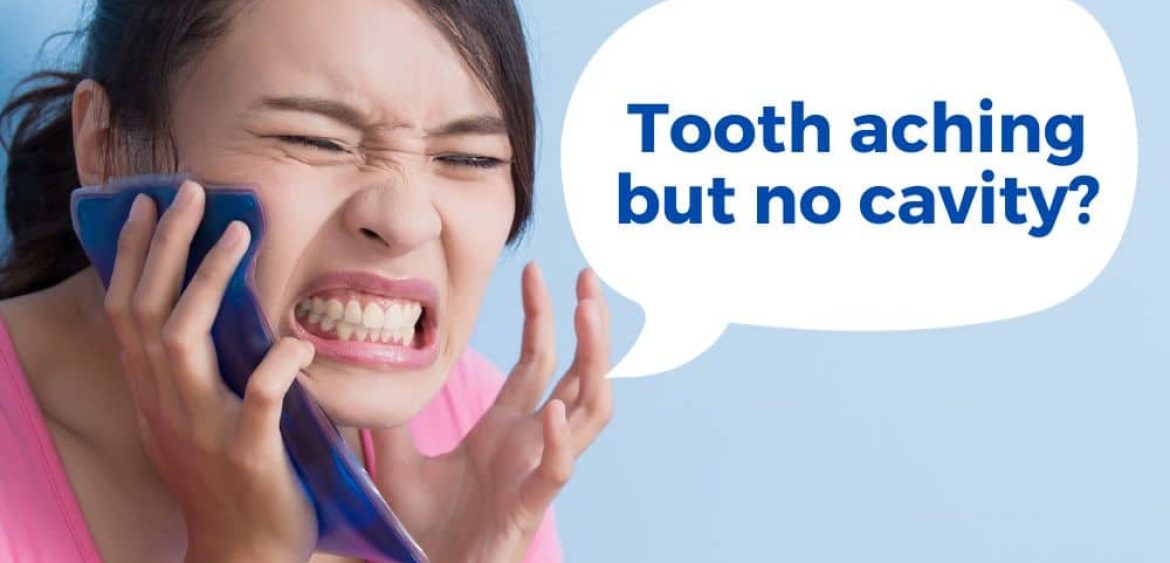Can your tooth still hurt when eating sweets even if you don’t have a cavity? Yes. You might think it’s impossible, given that cavities are often the main culprits behind toothaches. However, the truth is that you can experience this discomfort even if your teeth seem perfectly healthy.
In fact, having no cavities yet experiencing discomfort in your teeth after eating sweets is more common than you’d imagine. And there are several reasons why this could be happening to you. Let’s explain why…
Identifying the Cause of Tooth Pain
Sometimes, tooth sensitivity can make eating sweets feel like navigating through a minefield of sharp pain.
There are numerous reasons why our teeth may experience pain after consuming sweet foods or sugary drinks. But first, you’ll want to rule out any obvious signs of a cavity.
Teeth grinding or gum recession exposing sensitive tooth roots are factors that contribute to dental pain when eating sweets. And guess what?
That soft-bristled toothbrush you’ve been using at night? That too might be causing that twinge whenever you eat sweets.
You’re about to discover how teeth sensitivity might be the cause of your tooth pain.
Dentin Hypersensitivity Can Cause Your Tooth To Hurt Despite Zero Cavities
So if it’s not a cavity, then what’s hurting my teeth?
Your answer could be Dentin Hypersensitivity.
This condition, often called sensitive teeth, occurs when tooth enamel wears down or gum recession exposes the underlying layer of your teeth – the dentin.
When exposed to worn-down enamel or receding gums, hot, cold, and sugary substances have a more direct access to nerves inside the tooth causing sharp pain.
What are the Symptoms of Dentin Hypersensitivity
- A sudden short sharp pain triggered by eating sweets.
- Pain while consuming hot or cold food and drinks.
What are the Causes of Dentin Hypersensitivity
- Gum disease leads to swollen gums and eventual gum recession exposing more of your tooth roots.
- Tooth decay that hasn’t progressed into a full-blown cavity but has eroded some enamel away making teeth sensitive.
In essence, maintaining good oral hygiene can prevent conditions like this from developing. A sensitive tooth can feel similar to a cavity.
So you should familiarize yourself with what a cavity feels like when assessing the situation.
Watch this video to learn more about Dentin Hypersensitivity:
Other Causes For Tooth Pain When Eating Sweets
If it’s not enamel erosion or receding gums, that painful tooth might be caused by other factors. Here are 3 other reasons why your tooth may hurt despite the absence of cavities.
Gum Disease: Also known as periodontal disease, gum disease can cause swollen gums and tooth sensitivity. Poor oral hygiene often leads to this condition.
You might experience pain when sugar comes into contact with inflamed areas of the mouth. If left untreated, it may lead to tooth loss or require a root canal procedure.
Bruxism: Teeth grinding is common during sleep or stressful situations. It wears down tooth enamel over time leading to sensitive teeth that feel sharp pain from sugary foods like sticky sweets and fruit juice. Severe bruxism can lead to damaged teeth.
Damaged Tooth: A chipped tooth or tooth fracture exposes the dentin layer beneath the enamel which increases sugar sensitivity.
By the way, does it hurt when you bite down? It’s possible there is a problem with the root itself.
To know more about painful cavities, read here.
Let’s look at some ways to minimize that severe tooth pain.
If Your Tooth Hurts When Eating Sweets – Try This!
If your teeth hurt when eating sweets, you have some options.
Sensitive Teeth Treatments:
- Fluoride toothpaste strengthens tooth enamel and reduces pain from sensitive teeth. Ask your dentist about a prescription with higher fluoride. Don’t worry; it’s not expensive.
- A soft-bristled toothbrush, and gentle brushing to avoid further gum recession or damage to the tooth roots caused by hard brushing techniques.
- Tooth whitening treatments should be used cautiously as they can increase sensitivity in some cases. Consultation with dental professionals is recommended before proceeding with any such procedures.
Gum Disease Treatments:
- Treatment of periodontal disease often involves professional cleaning methods that remove plaque buildup causing swollen gums and potential root canal needs if left untreated.
- In severe cases, surgery may be required to treat advanced stages of gum disease effectively.
Dental health is a priority for our Kansas City staff at Village Dental and we’ve got you covered with various treatment and payment options.
Prevention Strategies for Tooth Pain When Eating Sweets
First, make sure it isn’t a cavity or some other oral health issue that needs to be examined by your dentist.
If not, then the best way to avoid tooth pain when eating sweets is prevention.
Limit your sugar intake.
This doesn’t mean you have to completely give up on your favorite treats, but moderation is key.
You can substitute sugary foods and drinks with those containing artificial sweeteners or enjoy fruit juices instead of sticky sweets that cling onto the teeth longer causing more damage.
Maintain good oral health:
- Avoiding tooth decay begins with brushing your teeth daily using a fluoride toothpaste and soft-bristled toothbrush which helps protect against enamel erosion and gum recession.
- Floss regularly: It removes plaque from between the teeth that a brush cannot reach thereby preventing periodontal disease that often leads to sensitive gums and eventually root exposure leading to sensitivity while consuming cold or hot items including sweet foods.
- Routine dental check-ups are crucial in maintaining optimal dental health as they help detect any early signs of cavities, swollen gums, or bruxism (teeth grinding) before they turn into major issues causing severe discomfort during meals, especially after having something sweet.
If these preventive measures don’t seem enough due to persistently sensitive teeth then consider opting for professional treatments like desensitizing agents application by dentists or undergoing procedures such as bonding, crown placement depending upon the severity of the condition.
With consistent care for our oral hygiene, we all can relish our preferred desserts without experiencing sharp pains anymore. Now let’s move forward answering some frequently asked questions about this topic.
Let’s Review Why Your Tooth Hurts When Eating Sweets
Understanding why your tooth hurts when eating sweets but no cavity is present can be a bit of a puzzle.
From dentin hypersensitivity to gum disease, bruxism, damaged teeth or worn down enamel – the causes are varied and complex.
Treatment options exist. They range from simple home remedies to professional dental care procedures.
Village Dental, your trusted family dental care in Kansas City, is here to help you navigate this perplexing issue. We offer comprehensive services tailored to meet all your oral health needs.
If you’re experiencing discomfort while enjoying sweet treats without any visible signs of cavities, it’s time for an expert opinion!
We invite you to visit us at Village Dental. Together we’ll find the solution that works best for you and helps restore the joy of savoring life’s little sweet pleasures without pain!
Give us a call: 816-263-3900
FAQs in Relation to Tooth Hurts When Eating Sweets But No Cavity
How do you get rid of sweet tooth pain?
If your teeth hurt when eating sweets, there are several ways to treat sensitive teeth.
You can start by switching to a fluoride toothpaste designed for sensitivity and use a soft-bristled toothbrush. Proper oral hygiene practices, like brushing and flossing daily, also help in reducing the discomfort.
Can I restore my tooth enamel?
While tooth enamel cannot be restored, it’s possible to strengthen weakened areas with proper dental care. Decreasing sugar intake from sugary foods or sticky sweets can prevent further damage.
Does tooth sensitivity eventually go away?
Tooth sensitivity caused by temporary factors such as gum recession or swollen gums may subside over time. However, persistent symptoms might indicate underlying issues like periodontal disease that require professional attention.
Why do my teeth hurt when I eat chocolate but nothing else?
Your teeth might hurt when eating chocolate because chocolate has a lot of sugar in it. Plus, it tends to “stick” to our teeth. So it delivers a whole bunch of sugar directly into the tooth.



